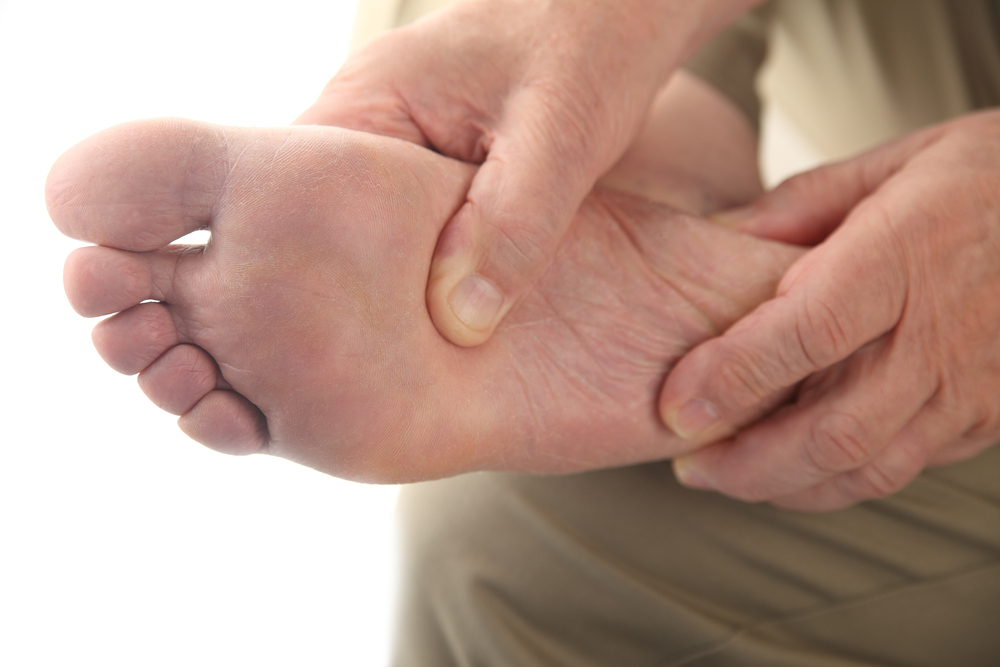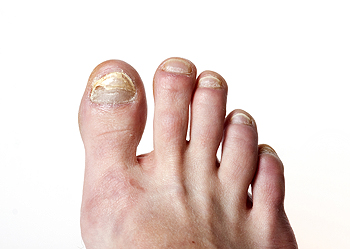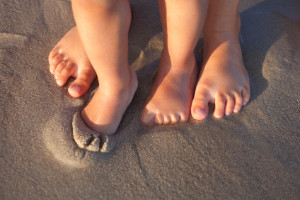Items filtered by date: January 2020
Can Sitting Lead To Poor Circulation?
 Poor circulation may occur in people who have medical conditions that include diabetes, or practice a sedentary lifestyle. Some of the symptoms that are associated with this condition may include a numbing or tingling sensation in the feet, and the feet may feel cold and tired. It may become worse with time, in which case there are measures that can be implemented which may help with poor circulation. These may include walking, swimming, and performing gentle stretching exercises. Additionally, eating foods that are healthy may increase circulation. If you are afflicted with poor circulation, it is suggested that you consult with a podiatrist who can help you to choose shoes that may prevent pain, in addition to protecting your feet.
Poor circulation may occur in people who have medical conditions that include diabetes, or practice a sedentary lifestyle. Some of the symptoms that are associated with this condition may include a numbing or tingling sensation in the feet, and the feet may feel cold and tired. It may become worse with time, in which case there are measures that can be implemented which may help with poor circulation. These may include walking, swimming, and performing gentle stretching exercises. Additionally, eating foods that are healthy may increase circulation. If you are afflicted with poor circulation, it is suggested that you consult with a podiatrist who can help you to choose shoes that may prevent pain, in addition to protecting your feet.
Poor circulation is a serious condition and needs immediate medical attention. If you have any concerns with poor circulation in your feet contact Dr. Odin De Los Reyes of Connecticut. Our doctor will treat your foot and ankle needs.
Poor Circulation in the Feet
Poor blood circulation in the feet and legs is can be caused by peripheral artery disease (PAD), which is the result of a buildup of plaque in the arteries.
Plaque buildup or atherosclerosis results from excess calcium and cholesterol in the bloodstream. This can restrict the amount of blood which can flow through the arteries. Poor blood circulation in the feet and legs are sometimes caused by inflammation in the blood vessels, known as vasculitis.
Causes
Lack of oxygen and oxygen from poor blood circulation restricts muscle growth and development. It can also cause:
- Muscle pain, stiffness, or weakness
- Numbness or cramping in the legs
- Skin discoloration
- Slower nail & hair growth
- Erectile dysfunction
Those who have diabetes or smoke are at greatest risk for poor circulation, as are those who are over 50. If you have poor circulation in the feet and legs it may be caused by PAD and is important to make changes to your lifestyle in order to reduce risk of getting a heart attack or stroke. Exercise and maintaining a healthy lifestyle will dramatically improve conditions.
As always, see a podiatrist as he or she will assist in finding a regimen that suits you. A podiatrist can also prescribe you any needed medication.
If you have any questions please feel free to contact our offices located in Southbury and Farmington, CT . We offer the newest diagnostic and treatment technologies for all your foot and ankle needs.
Gout Pain Can Be Managed
What Is The Medical Name For Toenail Fungus?
 When the toenails are affected by a fungus, it is medically referred to as onychomycosis. It enters the body and lives underneath the nail. Symptoms may gradually appear, and these can include a distorted nail that lifts off of the nail bed, in addition to the nail becoming thick and discolored. This contagious fungus thrives in moist and warm environments, which can consist of public swimming areas, shower room floors, and locker rooms. There may be pre-existing reasons why this type of fungus may develop. These can include medical conditions such as diabetes, poor circulation, or patients who have a weakened immune system. If you are afflicted with toenail fungus, it is suggested that you are under the care of a podiatrist who can prescribe the correct medication for you.
When the toenails are affected by a fungus, it is medically referred to as onychomycosis. It enters the body and lives underneath the nail. Symptoms may gradually appear, and these can include a distorted nail that lifts off of the nail bed, in addition to the nail becoming thick and discolored. This contagious fungus thrives in moist and warm environments, which can consist of public swimming areas, shower room floors, and locker rooms. There may be pre-existing reasons why this type of fungus may develop. These can include medical conditions such as diabetes, poor circulation, or patients who have a weakened immune system. If you are afflicted with toenail fungus, it is suggested that you are under the care of a podiatrist who can prescribe the correct medication for you.
For more information about treatment, contact Dr. Odin De Los Reyes of Connecticut. Our doctor can provide the care you need to keep you pain-free and on your feet.
Toenail Fungus Treatment
Toenail fungus is a condition that affects many people and can be especially hard to get rid of. Fortunately, there are several methods to go about treating and avoiding it.
Antifungals & Deterrence
Oral antifungal medicine has been shown to be effective in many cases. It is important to consult with a podiatrist to determine the proper regiment for you, or potentially explore other options.
Applying foot powder on the feet and shoes helps keep the feet free of moisture and sweat.
Sandals or open toed shoes – Wearing these will allow air movement and help keep feet dry. They also expose your feet to light, which fungus cannot tolerate. Socks with moisture wicking material also help as well.
If you have any questions please feel free to contact our offices located in Southbury and Farmington, CT . We offer the newest diagnostic tools and technology to treat your foot and ankle needs.
Podiatrists and Foot Surgery
 A podiatrist is a doctor that specializes in treating foot conditions. The initials DPM will generally appear after their name, and are an abbreviation for Doctor of Podiatric Medicine. Foot ailments these physicians typically treat can include plantar fasciitis, bunions, and hammertoes. Mandatory schooling consists of four years of podiatry medical school, followed by three years of specialized training. Some doctors choose to perform surgery to remove tumors, bunions, and heel spurs. If you are interested in pursuing podiatry as a career choice, it is advised that you consult with a podiatrist who can provide you with the information you need that may help you to make a decision.
A podiatrist is a doctor that specializes in treating foot conditions. The initials DPM will generally appear after their name, and are an abbreviation for Doctor of Podiatric Medicine. Foot ailments these physicians typically treat can include plantar fasciitis, bunions, and hammertoes. Mandatory schooling consists of four years of podiatry medical school, followed by three years of specialized training. Some doctors choose to perform surgery to remove tumors, bunions, and heel spurs. If you are interested in pursuing podiatry as a career choice, it is advised that you consult with a podiatrist who can provide you with the information you need that may help you to make a decision.
If you are dealing with pain in your feet and ankles, you may want to seek help from a podiatrist. Feel free to contact Dr. Odin De Los Reyes from Connecticut. Our doctor can provide the care you need to keep you pain-free and on your feet.
What Is a Podiatrist?
A podiatrist is a doctor of podiatric medicine who diagnoses and treats conditions of the foot, ankle, and related structures of the leg. Your podiatrist may specialize in a certain field such as sports medicine, wound care, pediatrics, and diabetic care. Podiatrists have the ability to become board certified through training, clinical experience, and then taking an exam.
What Do Podiatrists Do?
On a daily basis, a podiatrist may perform the following activities:
- Diagnose foot ailments such as ulcers, tumors, fractures, etc.
- Use innovative methods to treat conditions
- Use corrective orthotics, casts, and strappings to correct deformities
- Correct walking patterns and balance
- Provide individual consultations to patients
It is very important that you take care of your feet. It’s easy to take having healthy feet for granted, however foot problems tend to be among the most common health conditions. Podiatrists can help diagnose and treat a variety of feet related conditions, so it is crucial that you visit one if you need assistance.
If you have any questions please feel free to contact our offices located in Southbury and Farmington, CT . We offer the newest diagnostic and treatment technologies for all your foot and ankle needs.
Children and Walking Barefoot
 When babies are born, their feet are generally soft and flexible. Research has shown the feet may become stronger when walking is done barefoot while indoors. This may help to strengthen the overall foot as the toes grasp the floor for balance. When the first pair of shoes are purchased, it is helpful that the shoes are made of lightweight and breathable materials. Additionally, there needs to be adequate room at the top of the shoes so the toes can move freely. This may help to prevent ingrown toenails from developing. Good foot hygiene begins with teaching your child how to properly wash and dry their feet, in addition to helping them to stretch their feet. If you would like more information about how to care for children’s feet, please consult with a podiatrist.
When babies are born, their feet are generally soft and flexible. Research has shown the feet may become stronger when walking is done barefoot while indoors. This may help to strengthen the overall foot as the toes grasp the floor for balance. When the first pair of shoes are purchased, it is helpful that the shoes are made of lightweight and breathable materials. Additionally, there needs to be adequate room at the top of the shoes so the toes can move freely. This may help to prevent ingrown toenails from developing. Good foot hygiene begins with teaching your child how to properly wash and dry their feet, in addition to helping them to stretch their feet. If you would like more information about how to care for children’s feet, please consult with a podiatrist.
The health of a child’s feet is vital to their overall well-being. If you have any questions regarding foot health, contact Dr. Odin De Los Reyes of Connecticut. Our doctor can provide the care you need to keep you pain-free and on your feet.
Tips for Keeping Children's Feet Healthy
- Make sure their shoes fit properly
- Look for any signs of in-toeing or out-toeing
- Check to see if they have Clubfoot (condition that affects your child’s foot and ankle, twisting the heel and toes inward) which is one of the most common nonmajor birth defects.
- Lightly cover your baby’s feet (Tight covers may keep your baby from moving their feet freely, and could prevent normal development)
- Allow your toddler to go shoeless (Shoes can be restricting for a young child’s foot)
- Cut toenails straight across to avoid ingrown toenails
- Keep your child’s foot clean and dry
- Cover cuts and scrapes. Wash any scratches with soap and water and cover them with a bandage until they’ve healed.
If you have any questions, please feel free to contact our offices located in Southbury and Farmington, CT . We offer the newest diagnostic and treatment technologies for all your foot care needs.

